The Enlightened College Applicant
The Enlightened College Applicant
A New Approach to the Search and Admissions Process
Andrew Belasco and Dave Bergman
ROWMAN & LITTLEFIELD
Lanham Boulder New York London
Published by Rowman & Littlefield
A wholly owned subsidiary of The Rowman & Littlefield Publishing Group, Inc.
4501 Forbes Boulevard, Suite 200, Lanham, Maryland 20706
www.rowman.com
Unit A, Whitacre Mews, 2634 Stannary Street, London SE11 4AB
Copyright 2016 by Andrew Belasco and Dave Bergman
All rights reserved . No part of this book may be reproduced in any form or by any electronic or mechanical means, including information storage and retrieval systems, without written permission from the publisher, except by a reviewer who may quote passages in a review.
British Library Cataloguing in Publication Information Available
Library of Congress Cataloging-in-Publication Data
ISBN 978-1-4758-2690-6 (cloth : alk. paper)
ISBN 978-1-4758-2692-0 (electronic)
 The paper used in this publication meets the minimum requirements of American National Standard for Information SciencesPermanence of Paper for Printed Library Materials, ANSI/NISO Z39.48-1992.
The paper used in this publication meets the minimum requirements of American National Standard for Information SciencesPermanence of Paper for Printed Library Materials, ANSI/NISO Z39.48-1992.
Printed in the United States of America
To mom.
A.B.
For Leslie and Clara, my two loves.
D.B.
Contents
We gratefully acknowledge the support and suggestions of our partner, Michael Trivette. Michael, this book couldnt have been possible without your help.
We also wish to sincerely thank our editor at Rowman & Littlefield, Sarah Jubar, whose exceptional dedication to every aspect of The Enlightened College Applicant throughout the publishing process truly went above and beyond.
An Introduction
Early in Lois Lowrys classic young adult novel The Giver, a group of adolescents nervously await their fate at The Ceremony of Twelve, where town elders will single-handedly and irrevocably determine their vocational futures. For the books protagonist, Jonas, and his peers, everything is riding on this one moment. How they will spend every day of their lives going forward rests fully in the hands of these powerful decision-makers.
At the ceremony, some are selected to high-prestige posts like doctors, scientists, or engineers and others to more modest posts like street cleaners, landscapers, or general laborers. In this fictional society, The Ceremony of Twelve is the watershed moment in young peoples lives, and also one in which they have absolutely no agency.
Sadly, more than a decade and a half into the new millennium, the way in which the college admissions process is approached by many Americans might as well be termed the Ceremony of Eighteen . Each April, swarms of teens await word from their prospective universities with bated breath, their hopes and dreams unhealthily tied to gaining acceptance at a very select subset of name-brand schools.
Prospective college students, we do not envy you. You live in the age of information overload, where advice about college admissions is abundant to a fault. Chatter and hearsay on the topic is ubiquitous. In affluent neighborhoods, this phenomenon runs on overdrive: If he doesnt get into Columbia, I just dont know what hell do, says the woman in line at the deli as she waits for her chicken salad order to be filled.
The news media throws petrol on the inferno, regularly highlighting shrinking admission rates at elite colleges. Attempts to navigate through the cacophony of voices often result in students and families left adrift in the proverbial mile-wide, inch-deep ocean of cyberspace. Going down the Internet rabbit hole, they land on College Confidential or some other online forum, taking as gospel the words of some of the most negative, misinformed fear mongers on the planet (Insert FoxNews/MSNBC joke, depending on your political affiliation).
An internal monologue begins to develop in the heads of even the most reasonable, logical young people. If I dont get into this school, my chances at success are doomed. Level-headed parents, even, ironically, those who attended nonelite colleges themselves and went on to outstanding career accomplishments and financial success, suddenly believe that if their child is rejected from Duke, they will be relegated to a life of menial labor.
Its natural to get fixated on a particular name school , the type of recognizable and respected university whose bumper sticker would evoke jealousy in anyone breathing your exhaust fumes, whose presence adjacent to your childs name in their high school graduation program will stun that one teacher who never seemed to totally believe in him and cause other parents in the stands to ooh and ahh and say, perhaps with a wisp of jealousy, Now that young person is going places. And that highfalutin lady in the deli? Well, shell be crying in her chicken salad when she finds out that your kid got into Elite U and her son is stuck at State.
We get it. Encouraging people to adopt a more holistic and consumer-minded approach to college selection is about as easy as reprogramming the Manchurian Candidate. After all, messages about the overwhelming importance of your child attending a prestigious school have been gradually scaffolded in your brain, embedded deep within your subconscious, and, after 1718 years of reinforcement from family, friends, media, and popular culture, likely entangled with your own sense of self-worth.
The Giver slowly revealed the dark underbelly of an at-first seemingly utopian society. From an outsiders perspective, its easy to accept the college admissions process, like Lowrys fictional world, at face value. In a kind and innocent, Richard Scarry -like world, admissions officers would operate with pure intentions and egalitarian zeal, only wishing to further the noble cause of educating the next generation of responsible citizens. Of course, they would also probably be aardvarks.
Unfortunately, real life admissions officers have other, more institution-driven motives. Faced with financial pressures and a persistent need to climb the rankings of U.S. News and other publications, many devote considerable effort to drum up applicants for the purpose of rejecting more students and
THE BETTER ANGELS OF OUR NATURE
We are encouraged by the paradigm shift that has begun to take place in the college admissions discourse in recent years. Strong national voices like Frank Bruni and Lynn OShaughnessy, among others, have begun to peel away the fear-based and pretentious layers of the college admissions onion, urging families to consider fit before prestige, while highlighting the many postsecondary pathways to success.
The better angels of our nature finally seem to be emerging, as these saner voices have begun to take the college admissions dialogue in a healthier direction. Yet, there is a need to balance idealism with reality and to provide a more data-driven examination of college admissions in Americaone that is capable of distinguishing fact from fantasy. The Enlightened College Applicant will disabuse you of the notion that college admissions is all about getting in to an elite school; however, it will also honestly confront the ways in which college selectivity and reputation still matter. Of equal importance, this book will provide you and your child with the knowledge needed to make savvy college-related choices and win admission into institutions that account for the bigger picture of a students academic, professional, and personal life and that ultimately provide optimal returns on your educational investment.
We have spent the last decade working with thousands of high school and college students in a host of capacities: certified college counselors, teachers, college professors, and administrators. In addition to this experience on the ground , we both are higher education researchers with a birds-eye perspective of the college admissions landscape. Drawing on our practical and academic understanding of the admissions game, our goal is to give you and your child a comprehensive, evidence-based understanding of college admissions and planning and then teach you how to apply such understanding to your unique situation. It is our strong belief that after reading this book you will emerge a better-informed and more thoughtful college consumer.
Next page


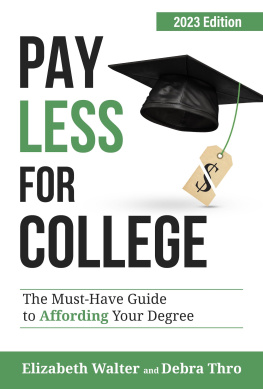
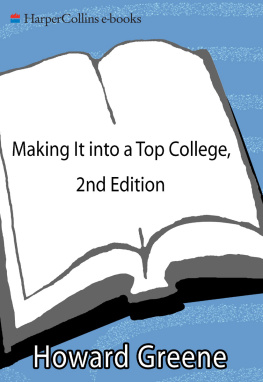
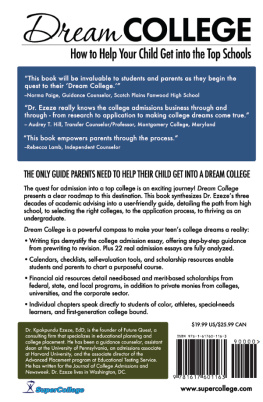
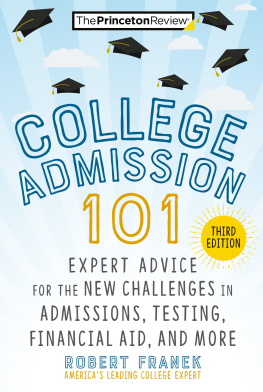
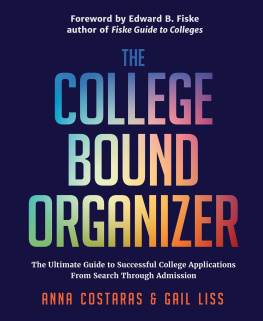
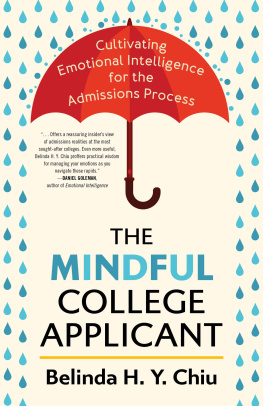
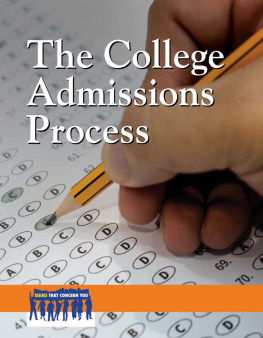
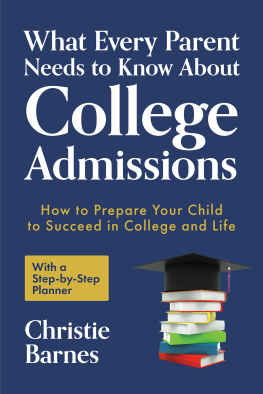
 The paper used in this publication meets the minimum requirements of American National Standard for Information SciencesPermanence of Paper for Printed Library Materials, ANSI/NISO Z39.48-1992.
The paper used in this publication meets the minimum requirements of American National Standard for Information SciencesPermanence of Paper for Printed Library Materials, ANSI/NISO Z39.48-1992.